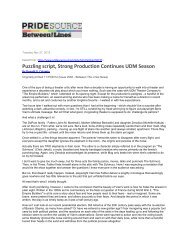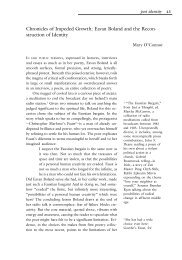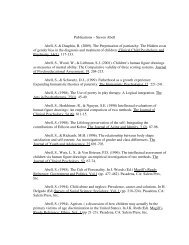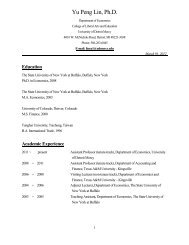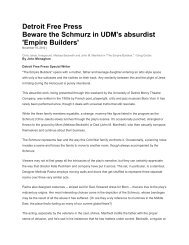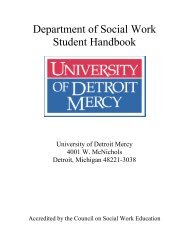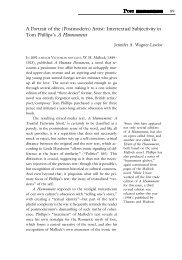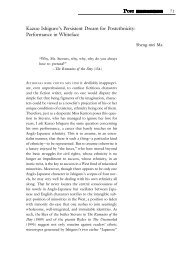Conquest, Conversion, and the Hybrid Self in Cabeza de Vaca's ...
Conquest, Conversion, and the Hybrid Self in Cabeza de Vaca's ...
Conquest, Conversion, and the Hybrid Self in Cabeza de Vaca's ...
Create successful ePaper yourself
Turn your PDF publications into a flip-book with our unique Google optimized e-Paper software.
142 POST OST IDENTITY<br />
IDENTITY<br />
10 For fur<strong>the</strong>r discussion of<br />
<strong>the</strong> ways <strong>in</strong> which cultural<br />
co<strong>de</strong>s shape i<strong>de</strong>ntity, see<br />
Greenblatt 1980, 1–9.<br />
traditional goals of conquest, but replaces it with an equally<br />
problematic paradigm of conquest. Even as discoverer, prior<br />
to <strong>the</strong>se two i<strong>de</strong>ntity transformations, <strong>Cabeza</strong> <strong>de</strong> Vaca experiences<br />
difficulties <strong>in</strong> dist<strong>in</strong>guish<strong>in</strong>g his coloniz<strong>in</strong>g approach<br />
from o<strong>the</strong>rs. Early <strong>in</strong> <strong>the</strong> narrative, before he ventures<br />
<strong>in</strong>to Florida, he has several disagreements with <strong>the</strong><br />
head of <strong>the</strong> expedition Governor Narváez. In particular,<br />
he objects to <strong>the</strong> Governor’s or<strong>de</strong>rs to leave <strong>the</strong> ships on<br />
<strong>the</strong> coast of Florida <strong>and</strong> to send an exploration party <strong>in</strong>to<br />
<strong>the</strong> <strong>in</strong>terior (26–7). In part, he is try<strong>in</strong>g to v<strong>in</strong>dicate his<br />
own actions on <strong>the</strong> Florida coast. But he is also caught <strong>in</strong><br />
a web of conflict<strong>in</strong>g co<strong>de</strong>s of conduct that produce a certa<strong>in</strong><br />
ambiguity about <strong>the</strong> role <strong>and</strong> function of colonial lea<strong>de</strong>rship.<br />
These compet<strong>in</strong>g forms of authority are already beg<strong>in</strong>n<strong>in</strong>g<br />
to shape <strong>and</strong> subvert personal i<strong>de</strong>ntity even before<br />
he encounters <strong>the</strong> natives <strong>in</strong> Florida.<br />
In all three cases, <strong>Cabeza</strong> <strong>de</strong> Vaca registers a variety of<br />
supportive <strong>and</strong> subversive impulses that complicate his attitu<strong>de</strong><br />
toward authority. This attitu<strong>de</strong> creates <strong>the</strong> possibility<br />
for <strong>the</strong>se multiple i<strong>de</strong>ntities to coexist, even though<br />
<strong>the</strong>y seem to have motives at odds with each o<strong>the</strong>r. With<strong>in</strong><br />
any culture, as Stephen Greenblatt has shown, <strong>the</strong>re will<br />
be an “elusive set of exchanges, a network of tra<strong>de</strong>s <strong>and</strong><br />
tra<strong>de</strong>-offs, a jostl<strong>in</strong>g of compet<strong>in</strong>g representations, a negotiation<br />
between jo<strong>in</strong>t-stock companies” (Greenblatt 1988,<br />
7). 10 The central difference between <strong>the</strong>se i<strong>de</strong>ntities is that<br />
<strong>the</strong> post-cultural contact ones require much more sophisticated<br />
l<strong>in</strong>guistic <strong>and</strong> rhetorical strategies to ma<strong>in</strong>ta<strong>in</strong> <strong>the</strong><br />
coloniz<strong>in</strong>g motive. No longer does <strong>the</strong> post-contact self<br />
wish to “conquer” <strong>the</strong> natives; he now wishes to “convert”<br />
<strong>the</strong>m. This slip between conquer/convert is similar<br />
to o<strong>the</strong>r maneuvers <strong>in</strong> <strong>the</strong> narrative between representation/recognition<br />
<strong>and</strong> conquistador/missionary. “Enslavement”<br />
is now called “conversion”; “discovery” of treasures<br />
is spoken of as a project of “evangeliz<strong>in</strong>g” <strong>the</strong> native population;<br />
<strong>and</strong> <strong>the</strong> “conquistador” is now refigured as a “missionary”<br />
whose greatest <strong>de</strong>sire is to reformulate <strong>the</strong> New<br />
World <strong>in</strong> <strong>the</strong> “image of God,” that is, a Christian empire<br />
un<strong>de</strong>r <strong>the</strong> control of Spa<strong>in</strong>. Imperialism is alive at <strong>the</strong> end<br />
of <strong>the</strong> tale, but <strong>in</strong> a transmuted, more politically beguil<strong>in</strong>g,<br />
form.<br />
Alan J. Silva




